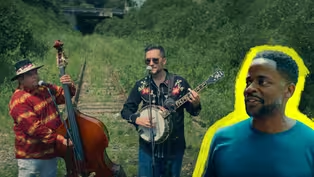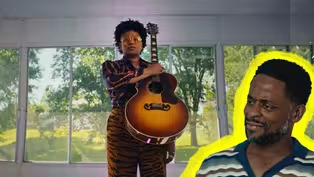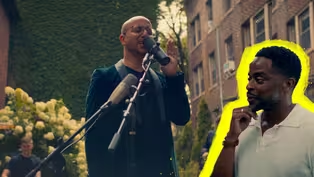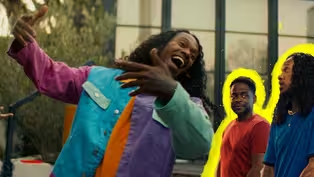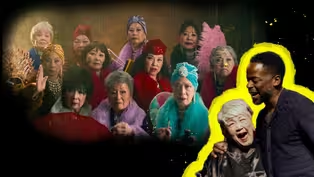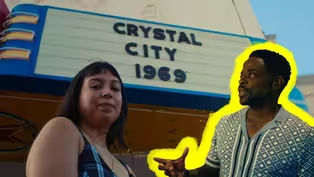
Reimagining the Mariachi Charro Suit
Special | 8m 36sVideo has Closed Captions
Mariachi Arcoiris de Los Angeles reimagines the mariachi charro suit.
Dulé Hill meets the founder of Mariachi Arcoiris de Los Angeles to learn more about how the world’s first LGBTQ+ mariachi group is re-imagining the traditional charro suit. From fabric selection, to rainbow details, tailors create unique ensembles.
Problems playing video? | Closed Captioning Feedback
Problems playing video? | Closed Captioning Feedback
This program was made possible by a grant from Anne Ray Foundation.

Reimagining the Mariachi Charro Suit
Special | 8m 36sVideo has Closed Captions
Dulé Hill meets the founder of Mariachi Arcoiris de Los Angeles to learn more about how the world’s first LGBTQ+ mariachi group is re-imagining the traditional charro suit. From fabric selection, to rainbow details, tailors create unique ensembles.
Problems playing video? | Closed Captioning Feedback
How to Watch The Express Way with Dulé Hill
The Express Way with Dulé Hill is available to stream on pbs.org and the free PBS App, available on iPhone, Apple TV, Android TV, Android smartphones, Amazon Fire TV, Amazon Fire Tablet, Roku, Samsung Smart TV, and Vizio.
Buy Now
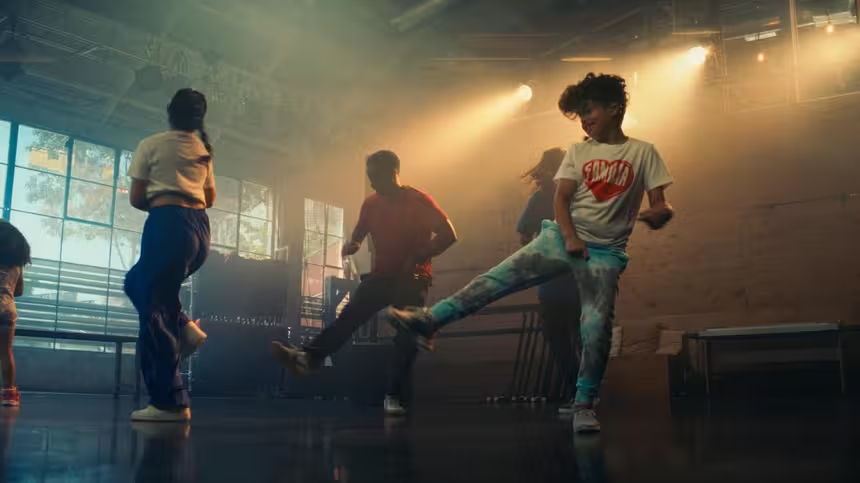
5 Artists Showcasing the Power of Art
From colorful cabarets and moving movies to artistic techniques that transcend the senses, here are five inspiring artists highlighted in The Express Way with Dulé Hill.Providing Support for PBS.org
Learn Moreabout PBS online sponsorshipMore from This Collection
This digital series follows Dulé Hill as he connects with diverse artists across America, exploring their history and letting us into their world on a deeper level.
Blending Latin Folk and Bluegrass Music
Video has Closed Captions
Larry & Joe are blending Latin folk and bluegrass music to show music has no borders. (16m 59s)
Finding Identity as a Black Appalachian Artist
Video has Closed Captions
Dulé Hill explores how music can provide solace and healing with musician Amythyst Kiah. (14m 51s)
Fighting for Syrian Refugees with Soul Music
Video has Closed Captions
A Syrian-American musician brings awareness to the civil war in his family’s homeland. (11m 32s)
Video has Closed Captions
Deaf dancer Shaheem Sanchez changes how Dulé Hill thinks about dance. (11m 42s)
Dulé Hill’s History of Tap Dance
Video has Closed Captions
Dulé Hill shares his motivation for mastering tap dance and carrying its legacy forward. (7m 45s)
Revitalizing Nightlife in San Francisco’s Chinatown
Video has Closed Captions
A multi-generational effort to preserve San Francisco Chinatown’s rich cultural history. (10m 3s)
Fighting for the Right to Speak Spanish
Video has Closed Captions
A new play tells the story of a Latino student walkout that changed history in Texas. (8m 13s)
Providing Support for PBS.org
Learn Moreabout PBS online sponsorship[trumpet playing] Carlos: In thinking that I needed to create this safe space for myself, I thought, there have to be other people who also need it.
There's something liberating about that.
Jesús: Mariachis a nosotros nos representan en toda... en todo el mundo.
En el momento que ven a un mariachi o ven un sombrero charro porque nos representan ellos en México.
Carlos: The music is beautiful.
So how do I help preserve this tradition but also express ourselves authentically?
♪ Dulé: Art is powerful.
♪ [mariachi music playing] I'm here in East Hollywood getting ready to go to Club Tempo.
Now, from my understanding, Club Tempo is a gay Latin cowboy club.
I've been to a gay club, I've been to a Latin club, and I've even been to a cowboy club.
What I've not done is been to a place that is all 3 in 1.
♪ Now I'm here to meet Carlos Samaniego, who is the founder of the first LGBTQ+ mariachi group named Mariachi Arcoíris de Los Angeles.
[mariachi music playing] Dulé: These talented musicians are making mariachi their own, from the music they play to the groundbreaking suits they wear on stage.
All: ¡Viva México!
[cheering] Dulé: The iconic mariachi suit originated with Mexican farm workers, or charros, over 400 years ago, and was later worn by revolutionaries in the Mexican War of Independence of 1810.
But it wasn't until the early 1900s that Mexican President Porfirio Diaz suggested mariachis take to the stage in the charro suit, and to this day, the suit remains a symbol of Mexican pride and male vitality.
All: ¡Olé!
Carlos: In the 1950s, Mexico went through the golden age of Mexican cinema.
They really were trying to push this idea of Mexican patriotism.
And with that comes this machista umbrella, with the English equivalent being a toxic masculinity.
This genre of music was supposed to be only sung and performed by cis straight men.
Those are the things that we are definitely fighting against in creating this group.
Dulé: Breaking with a tradition while also loving it and wanting to perpetuate it.
That's fascinating to me.
Hello, hello, hello.
Carlos: Hello.
-It's good to see you.
-Good to see you, too.
-Yeah.
-Yeah.
Dulé: Carlos has invited me to his home to learn more.
And to meet his husband, Victor, and his right hand woman, Natalia.
Nice to meet you.
-Good to meet you, too.
Dulé: The first openly trans woman in professional mariachi.
You know, it was women in mariachi that were our role models.
The women broke open the door for you all, and now you all said, "Okay, we're going to step in and take it even further."
Natalia: Yeah.
And it took me a minute to realize what that really meant.
With all these people reaching out to me in the beginning, you know, "Why are they reaching out to me?"
I'm just doing me.
Carlos: The oldest living mariachi in the world is called Mariachi Vargas.
It's been now over 100 years that they've been around, and to this day, there's never been a woman in Mariachi Vargas.
However, in the mariachi world, there is Rebecca Gonzalez.
Another woman is Monica Treviño.
Natalia: You know, we're the older ones of the group.
I think I'm the, the oldest...
I'm the oldest one.
He's always trying to call out somebody's age.
You know what I'm saying?
She's only gonna be 21 for so many years.
[all laugh] Carlos: I get it when I can, okay?
But what I'm saying is, you know, it's amazing for me to see these young musicians that are good musicians.
-Mm-hmm.
They'll never, ever have to experience the, the ridicule.
-Right.
The bullying that I've had to experience, the beatdowns, you know.
♪ About the age of 10, I started playing mariachi music and there was hardly no women in mariachi music back then.
I always had to abide by society and the rules of the world, but these people shared that with me.
Not be told what you can and cannot do.
♪ Dulé: Like the women who came before her, Natalia Melendez showed a new generation of musicians that they too could dream of becoming mariachis.
And today, there are other trans and non-binary musicians proudly performing alongside her in Mariachi Arcoíris, each in their own custom charro suit.
Carlos: So Victor is looking for fabrics for a new moño, a new bow tie, that will complement the new black suit.
Carlos: No.
[Both speak at once] Carlos: We would definitely have to add some kind of, uh, design.
Maybe with rhinestones.
Jesús: Ya queda el moño completamente para el charro.
O para el mariachi.
Tenemos diferentes tipos porque el charro normalmente usa un moño diferente a este, pero igual el bordado es lo mismo.
Azul: Obviously the silhouette of the mariachi suit is traditional, but this rhinestone, especially this sort of rainbow, is not traditional.
There are a lot of traditions and a lot of unspoken rules about suit etiquette and things like that.
So to have a really well fitting suit is really important.
And you know, I don't pass for female.
I'm non-binary.
I don't really want to pass for female.
I can't just go anywhere and go like, "Hey, could you make me a skirt?"
Not everyone's going to be comfortable doing that.
♪ I decided to start taking estrogen, and it has slowly started to reshape my body to the point where it is a physically different shape than it used to be.
If I were to wear my old suits, things would not fit very well.
So when I rejoined, I called up Natalia and I was like, "Hey, who do I go to for suits?"
♪ Natalia: From our costumes to our music, there's so much fabulousness of sparkles around the world.
This song is dedicated to all of our brothers and sisters that are still in the closet.
And it's for a positive thing.
It's a beautiful thing.
Carlos: Like I say during the performances, we have the responsibility of keeping the tradition, but at the same time to break away from it.
♪ Dulé: I was not necessarily aware of the power of Mariachi Arcoíris until you start having a conversation, you know where people have come from.
I can see the magnitude of what they're doing and it's really inspiring.
Natalia not only confronted machista traditions, but also had to find tailors and clothing that suited her.
Vivid rhinestones and rainbow bow ties carry special significance for Natalia, Azul, and the rest of Mariachi Arcoíris, as they boldly reimagined the traditional charro suit.
Carlos: Thank you so much.
We are Mariachi Arcoíris de Los Angeles.
Thank you.
¡Gracias!
[cheering] Dulé: All right, y'all.
Ha ha ha!
Thanks for watching.
For more of "The Express Way" with me, Dulé Hill, you can tune in to the full length series on the PBS app or your local PBS station.
Check out the link in the description to watch a full episode and find out more about the show.
Support for PBS provided by:
This program was made possible by a grant from Anne Ray Foundation.
